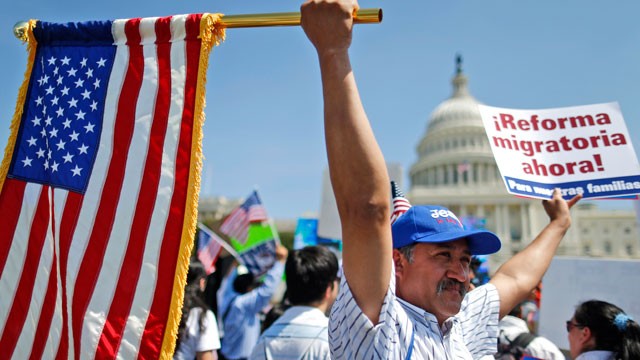On June 22, 2006 the United States Supreme Court issued a ruling in Fernandez-Vargas v. Gonzales in which the Court held that a 1996 provision of the Immigration and Naturalization Act (INA) could be applied to individuals who had been deported and subsequently reentered the country, even though their actions occurred prior to 1996.
Humberto Fernandez-Vargas, a Mexican truck driver, was deported from the United States several times in 1970’s and 1980’s. In 1982, three months after his most recent deportation, he illegally entered the U.S. once again. He remained in the country continuously and established his own trucking business, married a U.S. Citizen, and had a son. After his marriage in 2001 (nineteen years after he had last entered the United States) Fernandez-Vargas applied to adjust his status and become a legal resident. In 2003, while at an interview related to his application, he was arrested on a 1981 deportation warrant. He was detained for a year and then deported to Mexico.
The provision of the INA that led to his arrest is a section that became law in 1996. It provides that, if an individual is removed from the United States and subsequently reenters the country, the prior order of removal can be enforced and the individual is not eligible for the types of legal relief that would usually be available to challenge the order. Under the provision, if it is determined that the individual illegally reentered the U.S. after being deported, he can be deported again at any time. Fernandez-Vargas argued that, because the law was enacted in 1996 and his illegal reentry had occurred fifteen years before its enactment, applying the law “retroactively” to him was an unconstitutional violation of his right to due process.
As a general rule, laws cannot be applied retroactively. Justice Stevens, in his lone dissent, argued that the law was retroactive because, in his words, the “government has changed the rules mid-game.” But the majority of the Court took a different view. It held that, because the law was being applied to Fernandez-Vargas’ ongoing conduct of illegally remaining in the country and not to his prior conduct of illegally entering the country, its application was not retroactive and not unconstitutional. Writing for the majority, Justice Souter said, “It is the conduct of remaining in the country after entry that is the predicate action; the statute applies to stop an indefinite continuing violation that the alien himself could end at any time by voluntarily leaving.”
While it is unclear how broad the impact of this ruling will be, the case could have implications for thousands of other illegal immigrants in similar situations.
Nothing in this article should be taken as legal advice for an individual case or situation. The information is intended to be general and should not be relied upon for any specific situation. For legal advice, consult and attorney experience in immigration law.







